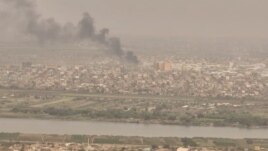24 April 2023
Foreign governments have evacuated hundreds of diplomats and other citizens from Sudan since Sunday.
For Sudanese, the evacuation is a sign that international powers expect conditions to worsen in the North African nation.
The fighting between forces loyal to two top Sudanese generals has killed over 420 and injured more than 3,700. The country is at risk of collapse and the fighting could affect others far beyond its borders.

A drone view shows smoke rising over the Khartoum North Light Industrial Area, in Bahri, Sudan, April 23, 2023, in this still image taken from video obtained by Reuters. (Video obtained by Reuters/ via REUTERS)
Who is fighting?
The leaders of the two fighting forces are General Abdel Fattah Burhan, head of the armed forces, and General Mohammed Hamdan Dagalo of a paramilitary group known as the Rapid Support Forces (RSF).
The two generals came to power after pro-democracy protests led to the 2019 ouster of long-time ruler Omar al-Bashir. In 2021, the two joined forces to seize power from a civilian government.
In recent months, negotiations were underway for a return to a democratic political system. Tensions between Burhan and Dagalo worsened during negotiations to reach a final agreement. The main dispute is over how the RSF would be mixed into the military and who would have control over fighters and weapons.
Alex De Waal is a Sudan expert at Tufts University. He wrote in a note to colleagues this week that the conflict should be seen as "the first round of a civil war."
How does the fighting affect Sudan's neighbors?
Sudan is Africa's third-largest country by area.
The country uneasily shares the waters of the Nile River with Egypt and Ethiopia. Egypt relies on the Nile to support its population of over 100 million. Ethiopia is working on a huge dam to contain water upstream.
Egypt has close ties to Sudan's military, which it sees as an ally against Ethiopia. Egypt has contacted both sides in Sudan to press for a cease-fire. But Egypt is unlikely to stand by if the military faces defeat.
Sudan borders five other countries: Libya, Chad, the Central African Republic, Eritrea, and South Sudan. Nearly all of them face internal conflict, with different rebel groups operating along the borders.
"What happens in Sudan will not stay in Sudan," said Alan Boswell of the International Crisis Group. "Chad and South Sudan look most immediately at risk of potential spillover. But the longer (the fighting) drags on the more likely it is we see major external intervention."
Which foreign powers are involved in Sudan?
Arab Gulf countries have looked to Africa in recent years as they have sought to project power across the area.
The United Arab Emirates has close ties to the Rapid Support Forces. The group sent thousands of fighters to aid the UAE and Saudi Arabia in their war against Iran-backed Houthi rebels in Yemen.
Russia has long had plans to build a naval base at Port Sudan that could support up to 300 troops and four ships. The Red Sea port is on the busy trading route for energy shipments to Europe.
The Wagner Group is a Russian mercenary organization with close ties to Russian President Vladimir Putin's government. The group has been operating in Sudan since 2017. The United States and the European Union have established economic measures against two Wagner-linked companies. The gold mining companies were accused of smuggling.
Sudan became an outsider nation when it sheltered Osama bin Laden and other militants in the 1990s. Omar al-Bashir, the country's ruler at the time, had led a hard-line Islamist government.
Sudan's isolation deepened over the conflict in western Darfur in the 2000s. At the time, the Sudanese forces and tribal fighters were accused of carrying out war crimes while suppressing a local rebellion. The International Criminal Court later charged al-Bashir with genocide.
Controls over economy
The U.S. removed Sudan from its list of state supporters of terrorism after the government in Khartoum agreed to establish ties with Israel in 2020.
But billions of dollars in loans and aid were suspended after the 2021 military takeover. The lack of foreign support, inflation and the war in Ukraine have all hurt Sudan's economy.
Armed groups in Sudan have long enriched themselves through the control of minerals and other natural resources.
Dagalo has large farm animal holdings and gold mining operations. He is also believed to have been paid by Gulf countries for the RSF's services in fighting rebels in Yemen.
The Sudanese military under Burhan controls much of the country's economy. It also depends on businessmen who grew rich during al-Bashir's long rule.
De Waal of Tufts University said control over money is as important as over the battlefield. "(The military) will want to take control of gold mines and smuggling routes. The RSF will want to interrupt major transport arteries including the road from Port Sudan to Khartoum," he said.
I'm Mario Ritter Jr. And I'm Jill Robbins.
Hai Do adapted this report for VOA Learning English from Associated Press sources.
________________________________________________________________
Words in This Story
evacuated –n. to remove people, usually quickly, from a dangerous place; to leave a place
external –adj. outside; used on the exterior of something
project –v. to expand influence onto a place
route –n. a road or way taken for trade or travel
mercenary –adj. relating to fighters who are paid for their services but are not part of a country's military and might not be citizens of the country employing them
smuggling –n. the act of trafficking in goods illegally from one area to another
isolation –n. the condition of being alone